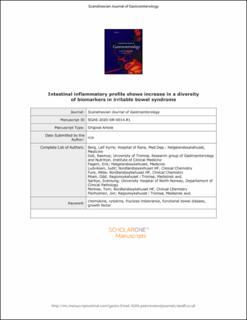Intestinal inflammatory profile shows increase in a diversity of biomarkers in irritable bowel syndrome
Berg, Leif Kyrre; Goll, Rasmus; Fagerli, Erik; Ludviksen, Judith K; Fure, Hilde; Odd Sverre, Moen; Sørbye, Sveinung; Mollnes, Tom Eirik; Florholmen, Jon
Peer reviewed, Journal article
Accepted version

Åpne
Permanent lenke
https://hdl.handle.net/11250/2735393Utgivelsesdato
2020Metadata
Vis full innførselSamlinger
Originalversjon
Scandinavian Journal of Gastroenterology. 2020, 55 (5), 537-542. 10.1080/00365521.2020.1754455Sammendrag
Background: It has been proposed that irritable bowel syndrome (IBS) is a low-grade mucosal inflammatory disease.
Objective: To characterize the intestinal inflammatory profile in IBS patients with or without fructose intolerance.
Design: Patients referred to colonoscopy with IBS complaints were screened for participation. IBS patients diagnosed according to the Rome II criteria and with no organic gastrointestinal disease were included in the study. One subgroup was patients included in a fructose-reduced diet study for 2 months with effects based on VAS symptom scores. Healthy controls were subjects under investigation of colorectal cancer screening with no IBS or other gastrointestinal diseases. All patients included had normal histology from rectum. Mucosal cytokines, chemokines and growth factors were measured by multiplex technology.
Results: Of 27 inflammatory markers tested in the mucosal tissue, 13 were significantly increased and none was significantly decreased in IBS as compared to controls. Significantly increased were the proinflammatory cytokines tumor necrosis factor, the typical TH1 markers IFNγ, IL-1β, IL-2 and RANTES, the typical TH2 markers IL-5 and IL-9, the TH17 marker IL-17, TNF, the pleiotropic IL-15, and the growth factors bFGF and GM-CSF. In IBS patients with fructose intolerance only IL-5 was significantly increased compared to patients without fructose intolerance.
Conclusions: A dysregulated mucosal inflammatory profile with an increased level of TH1, TH2 and TH17 markers, and growth factors were observed in bowel mucosa in of IBS patients when compared to healthy controls.